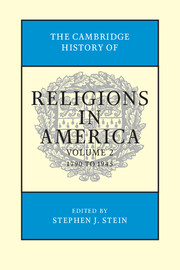Book contents
- Frontmatter
- Contents
- Contributors
- Editor's Introduction
- SECTION I RELIGION IN NORTH AMERICA
- SECTION II RELIGIONS IN THE NEW NATION, 1790–1865
- SECTION III CHANGING RELIGIOUS REALITIES
- SECTION IV RELIGIOUS RESPONSES TO MODERN LIFE AND THOUGHT
- 21 Religion and Immigration, 1865–1945
- 22 Religion and the Modern City, 1865–1945
- 23 Religious Responses to Industrialization, 1865–1945
- 24 Religious Responses to Modern Science, 1865–1945
- 25 Religious Responses to Philosophy in America, 1865–1945
- 26 Fundamentalism
- 27 Religiously Informed Social Reform and Reaction in the Era of the Great Depression
- 28 Nativism from the New Republic to the Cold War
- 29 Between God and Caesar: World War I and America's Religious Communities
- 30 World War II and America's Religious Communities
- SECTION V COMPARATIVE ESSAYS
- SECTION VI RELIGION AND DIVERSE AREAS
- Index
- References
30 - World War II and America's Religious Communities
from SECTION IV - RELIGIOUS RESPONSES TO MODERN LIFE AND THOUGHT
Published online by Cambridge University Press: 28 July 2012
- Frontmatter
- Contents
- Contributors
- Editor's Introduction
- SECTION I RELIGION IN NORTH AMERICA
- SECTION II RELIGIONS IN THE NEW NATION, 1790–1865
- SECTION III CHANGING RELIGIOUS REALITIES
- SECTION IV RELIGIOUS RESPONSES TO MODERN LIFE AND THOUGHT
- 21 Religion and Immigration, 1865–1945
- 22 Religion and the Modern City, 1865–1945
- 23 Religious Responses to Industrialization, 1865–1945
- 24 Religious Responses to Modern Science, 1865–1945
- 25 Religious Responses to Philosophy in America, 1865–1945
- 26 Fundamentalism
- 27 Religiously Informed Social Reform and Reaction in the Era of the Great Depression
- 28 Nativism from the New Republic to the Cold War
- 29 Between God and Caesar: World War I and America's Religious Communities
- 30 World War II and America's Religious Communities
- SECTION V COMPARATIVE ESSAYS
- SECTION VI RELIGION AND DIVERSE AREAS
- Index
- References
Summary
World War II profoundly transformed American society and the relationship of the United States with the world. The demands of total war led to an unprecedented mobilization of American society that had a profound influence upon religious life. Religious ideals played a prominent part in the ideological struggle against the forces of Nazi Germany, Fascist Italy, and Imperial Japan. Even before America's entrance into the war, President Franklin D. Roosevelt proclaimed freedom of religion and conscience as one of the essential Four Freedoms that the United States sought to promote in a new world order that emerged after the defeat of Nazi Germany. He sought to enlist the support of religious leaders in the fight against Fascism, especially in the heated debates in 1940 and 1941 over mobilization and providing aid to Great Britain and later the Soviet Union. America's clergy and theologians were divided over whether the United States should enter the war, and their divisions mirrored those of the wider public. After the Japanese attack on Pearl Harbor on 7 December 1941, the vast majority of religious leaders and believers supported the war.
Religion served as an important influence on Franklin Roosevelt, who was an Episcopalian, and his speeches throughout his presidency echoed appeals to the Christian values of social justice and charity as well as stressed the need for interfaith tolerance.
- Type
- Chapter
- Information
- The Cambridge History of Religions in America , pp. 653 - 674Publisher: Cambridge University PressPrint publication year: 2000

